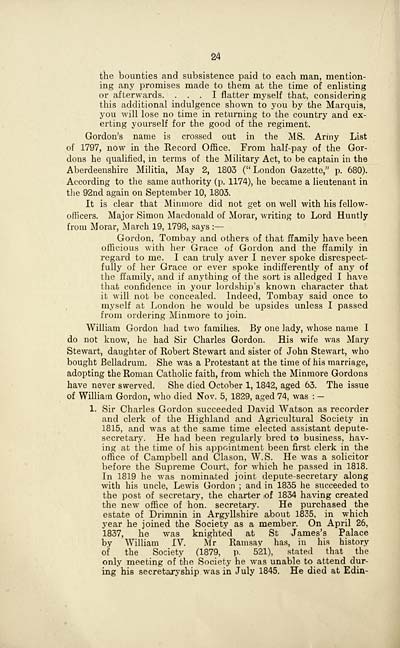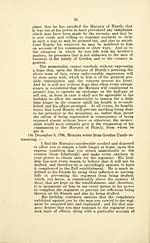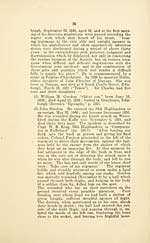Download files
Complete book:
Individual page:
Thumbnail gallery: Grid view | List view

24
the bounties and subsistence paid to each man, mention-
ing any promises made to them at the time of enlisting
or afterwards. ... I flatter myself that, considering
this additional indulgence shown to you by the Mai*quis,
you will lose no time in returning to the country and ex-
erting yourself for the good of the regiment.
Gordon's name is crossed out in the MS. Army List
of 1797, now in the Eecord Office. From half-pay of the Gor-
dons he qualified, in terms of the Military Act, to be captain in the
Aberdeenshire Militia, May 2, 1803 ("London Gazette," p. 680).
According to the same authority (p. 1174), he became a lieutenant in
the 92nd again on September 10, 1803.
It is clear that Minmore did not get on well with his fellow-
officers. Major Simon Macdonald of Morar, writing to Lord Huntly
from Morar, March 19, 1798, says : —
Gordon, Tombay and others of that ffamily have been
officious with her Grace of Gordon and the ffamily in
regard to me. I can truly aver I never spoke disrespect-
fully of her Grace or ever spoke indifferently of any of
the ffamily, and if anything of the sort is alledged I have
that confidence in your lordship's known character that
it will not be concealed. Indeed, Tombay said once to
myself at London he would be upsides unless I passed
from ordering Minmore to join.
William Gordon had two families. By one lady, whose name I
do not know, he had Sir Charles Gordon. His wife was Mary
Stewart, daughter of Robert Stewart and sister of John Stewart, who
bought Belladrum. She was a Protestant at the time of his marriage,
adopting the Roman Catholic faith, from which the Minmore Gordons
have never swerved. She died October 1, 1842, aged 63. The issue
of William Gordon, who died Nov. 5, 1829, aged 74, was : —
1. Sir Charles Gordon succeeded David Watson as recorder
and clerk of the Highland and Agricultural Society in
1815, and was at the same time elected assistant depute-
secretary. He had been regularly bred to business, hav-
ing at the time of his appointment been first clerk in the
office of Campbell and Clason, W.S. He was a solicitor
before the Supreme Court, for which he passed in 1818.
In 1819 he was nominated joint depute-secretary along
with his uncle, Lewis Gordon ; and in 1835 he succeeded to
the post of secretary, the charter iof 1834 having created
the new office of hon. secretary. He purchased the
estate of Drimnin in Argyllshire about 1835, in which
year he joined the Society as a member. On April 26,
1837, he was knighted at St James's Palace
by William IV. Mr Ramsav has, in his history
of the Society (1879, p. 521), stated that the
only meeting of the Society he was unable to attend dur-
ing his secretaryship was in July 1845. He died at Edin-
the bounties and subsistence paid to each man, mention-
ing any promises made to them at the time of enlisting
or afterwards. ... I flatter myself that, considering
this additional indulgence shown to you by the Mai*quis,
you will lose no time in returning to the country and ex-
erting yourself for the good of the regiment.
Gordon's name is crossed out in the MS. Army List
of 1797, now in the Eecord Office. From half-pay of the Gor-
dons he qualified, in terms of the Military Act, to be captain in the
Aberdeenshire Militia, May 2, 1803 ("London Gazette," p. 680).
According to the same authority (p. 1174), he became a lieutenant in
the 92nd again on September 10, 1803.
It is clear that Minmore did not get on well with his fellow-
officers. Major Simon Macdonald of Morar, writing to Lord Huntly
from Morar, March 19, 1798, says : —
Gordon, Tombay and others of that ffamily have been
officious with her Grace of Gordon and the ffamily in
regard to me. I can truly aver I never spoke disrespect-
fully of her Grace or ever spoke indifferently of any of
the ffamily, and if anything of the sort is alledged I have
that confidence in your lordship's known character that
it will not be concealed. Indeed, Tombay said once to
myself at London he would be upsides unless I passed
from ordering Minmore to join.
William Gordon had two families. By one lady, whose name I
do not know, he had Sir Charles Gordon. His wife was Mary
Stewart, daughter of Robert Stewart and sister of John Stewart, who
bought Belladrum. She was a Protestant at the time of his marriage,
adopting the Roman Catholic faith, from which the Minmore Gordons
have never swerved. She died October 1, 1842, aged 63. The issue
of William Gordon, who died Nov. 5, 1829, aged 74, was : —
1. Sir Charles Gordon succeeded David Watson as recorder
and clerk of the Highland and Agricultural Society in
1815, and was at the same time elected assistant depute-
secretary. He had been regularly bred to business, hav-
ing at the time of his appointment been first clerk in the
office of Campbell and Clason, W.S. He was a solicitor
before the Supreme Court, for which he passed in 1818.
In 1819 he was nominated joint depute-secretary along
with his uncle, Lewis Gordon ; and in 1835 he succeeded to
the post of secretary, the charter iof 1834 having created
the new office of hon. secretary. He purchased the
estate of Drimnin in Argyllshire about 1835, in which
year he joined the Society as a member. On April 26,
1837, he was knighted at St James's Palace
by William IV. Mr Ramsav has, in his history
of the Society (1879, p. 521), stated that the
only meeting of the Society he was unable to attend dur-
ing his secretaryship was in July 1845. He died at Edin-
Set display mode to:
![]() Universal Viewer |
Universal Viewer | ![]() Mirador |
Large image | Transcription
Mirador |
Large image | Transcription
Images and transcriptions on this page, including medium image downloads, may be used under the Creative Commons Attribution 4.0 International Licence unless otherwise stated. ![]()
| Histories of Scottish families > Gordons and Smiths at Minmore, Auchorachan, and Upper Drumin in Glenlivet > (32) Page 24 |
|---|
| Permanent URL | https://digital.nls.uk/95712471 |
|---|
| Description | A selection of almost 400 printed items relating to the history of Scottish families, mostly dating from the 19th and early 20th centuries. Includes memoirs, genealogies and clan histories, with a few produced by emigrant families. The earliest family history goes back to AD 916. |
|---|

